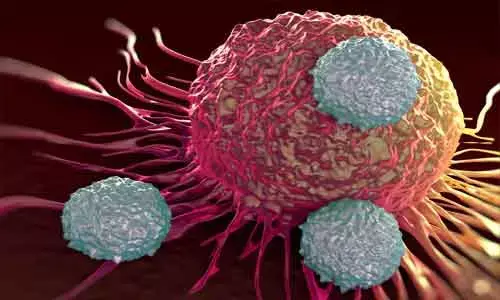- Home
- Medical news & Guidelines
- Anesthesiology
- Cardiology and CTVS
- Critical Care
- Dentistry
- Dermatology
- Diabetes and Endocrinology
- ENT
- Gastroenterology
- Medicine
- Nephrology
- Neurology
- Obstretics-Gynaecology
- Oncology
- Ophthalmology
- Orthopaedics
- Pediatrics-Neonatology
- Psychiatry
- Pulmonology
- Radiology
- Surgery
- Urology
- Laboratory Medicine
- Diet
- Nursing
- Paramedical
- Physiotherapy
- Health news
- Fact Check
- Bone Health Fact Check
- Brain Health Fact Check
- Cancer Related Fact Check
- Child Care Fact Check
- Dental and oral health fact check
- Diabetes and metabolic health fact check
- Diet and Nutrition Fact Check
- Eye and ENT Care Fact Check
- Fitness fact check
- Gut health fact check
- Heart health fact check
- Kidney health fact check
- Medical education fact check
- Men's health fact check
- Respiratory fact check
- Skin and hair care fact check
- Vaccine and Immunization fact check
- Women's health fact check
- AYUSH
- State News
- Andaman and Nicobar Islands
- Andhra Pradesh
- Arunachal Pradesh
- Assam
- Bihar
- Chandigarh
- Chattisgarh
- Dadra and Nagar Haveli
- Daman and Diu
- Delhi
- Goa
- Gujarat
- Haryana
- Himachal Pradesh
- Jammu & Kashmir
- Jharkhand
- Karnataka
- Kerala
- Ladakh
- Lakshadweep
- Madhya Pradesh
- Maharashtra
- Manipur
- Meghalaya
- Mizoram
- Nagaland
- Odisha
- Puducherry
- Punjab
- Rajasthan
- Sikkim
- Tamil Nadu
- Telangana
- Tripura
- Uttar Pradesh
- Uttrakhand
- West Bengal
- Medical Education
- Industry
Accidentally discovered 'cancer cure' effective for treatment of all cancer types

UK: The researchers at Cardiff University's School of Medicine have accidentally discovered a new type of immune cell that kills most cancers, marking a breakthrough in cancer treatment. The researchers found a new type of T-cell that can potentially combat cancer. The findings of the study are published in the journal Nature Immunology.
The accidental discovery was made when the scientists were analyzing blood samples for immune cells that could fight bacteria. They instead discovered the T-cell, a never-before-seen receptor that only latches on to cancerous cells, ignoring healthy ones.
Though the discovery is still young, it serves as a stepping stone for other researchers to build on the new approach to study it further and start on both animal and human studies.
The immune system is the defense of the body against harmful pathogens (foreign bodies) that may enter the body. Immune cells, such as macrophages and white blood cells work simultaneously to fight off disease-causing organisms including cancer. Immunotherapy is used to target cancer cells, but in some instances, they only for some types. It's usually made of white blood cells and some organs and tissues from the lymph system.
For years, doctors have used CAR-T therapy for cancer treatment. This treatment involves getting the patient's own immune cells and genetically modifying them. In this method, the T cells are then returned to the body where they start to hunt and kill cancer cells. The drawback of this treatment is that it only targets some type of cancer cells, such as bone marrow and blood cancer but is not effective for solid tumors that account for the majority of cancer cases.
Since the scope of efficacy is limited, scientists are looking for other ways the immune system naturally attacks tumors, hoping to find something that can kill multiple cancer cells all at once.
How this novel treatment works
The novel T-cell is believed to have the ability to distinguish cancer cells from healthy ones. It carries a never-before-seen receptor that latches on to most human cancers while ignoring healthy cells in the body.
The surface molecule, MR1, where the new T-cell attaches to, is also found in almost all cells in the body. But they may present differently on cancer cells, permitting a single TCR to be able to effectively target many types of tumors.
In laboratory studies, the researchers found that the immune cell equipped with the new receptor was revealed to kill skin, lung, colon, blood, bone, breast, kidney, ovarian, prostate, and cervical cancer.
"The development of a 'one size fits all' type of immunotherapy, which could target different types of cancer cells and does not need to be manufactured for each individual patient, is an exciting prospect. This research represents a new way of targeting cancer cells that is really quite exciting, although much more research is needed to understand precisely how it works. It is still early days and we are a while off from confirming whether this approach will definitely work in patients," Dr. Alasdair Rankin, Director of Research and Policy at the blood cancer charity Bloodwise, said.
The new breakthrough could pave the way for the formulation of new and effective therapy to combat cancer.
The study, "Genome-wide CRISPR–Cas9 screening reveals ubiquitous T cell cancer targeting via the monomorphic MHC class I-related protein MR1," is published in the journal Nature Immunology.
DOI: https://doi.org/10.1038/s41590-019-0578-8
Dr Kamal Kant Kohli-MBBS, DTCD- a chest specialist with more than 30 years of practice and a flair for writing clinical articles, Dr Kamal Kant Kohli joined Medical Dialogues as a Chief Editor of Medical News. Besides writing articles, as an editor, he proofreads and verifies all the medical content published on Medical Dialogues including those coming from journals, studies,medical conferences,guidelines etc. Email: drkohli@medicaldialogues.in. Contact no. 011-43720751


